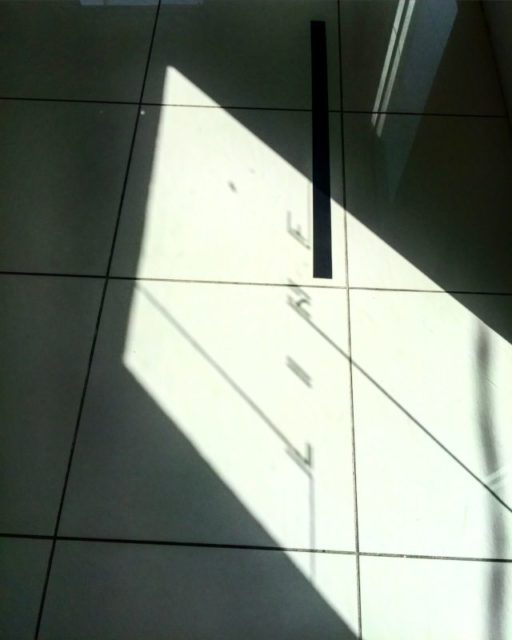“LINE” May 22nd – June 3rd, 2017 @ Y Gallery 26 Taylor Street, Woodbrook. Trinidad and Tobago. Artists were given a single piece of paper and a single theme to explore- ‘Line”.
///
“LINE” is a visually tantalizing show featuring twelve contemporary Artists from Trinidad and Tobago from veterans, Jackie Hinkson and Wendy Nanan to lesser known practicioners, Jade Drakes and Martin Mouttet.
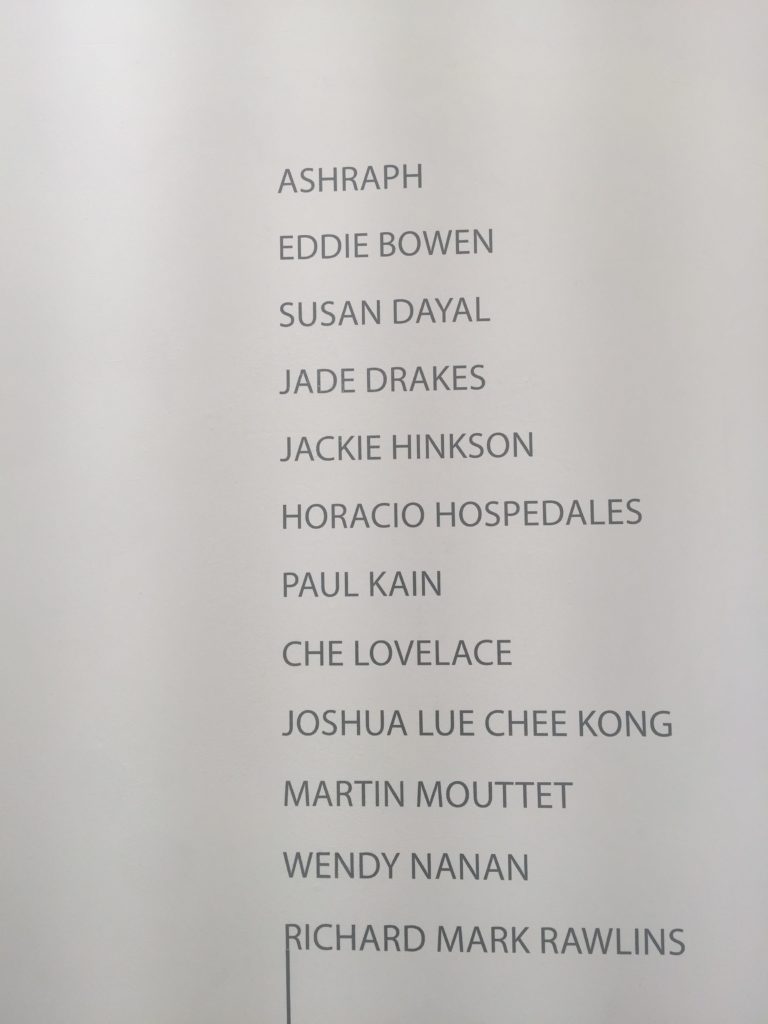
The Y Gallery as a space is all glass and terrazo interior and walking in to see this show, at first I had no bearings, and needed to get my thoughts around many extremely different approaches to the request of the Curator, Melanie Archer and Gallery owner and Co-Curator, Yasmin Hadeed.
“LINE” as a show has made me ask questions that I may not ask in any other context. Questions such as why this? Why now? And, what were the parameters for it at this time? I also asked, how would the public view the work within? A glance at the price list showed figures from TT$6400 to as much as $25,000 with one price upon request. Now there was the literal rub.
“LINE” was a show of works on the simplest material – paper. The request was made of the Artists, to take a sheet alotted to them, sized, 29 inches by 72 inches and create a work based on the theme of ‘line.’
Do we in Trinidad and Tobago have a rigorous history of buying drawings on paper? I wondered, as I walked around the room, I felt continuously stumped by what I was seeing. LINE, yes, but somehow, the placement of the pieces – some similar in size, while others were cut up and made into a series – all vied for my eye. I was trying to find some connection between the pieces.
Very quickly, I began to guess who was who, and slowly something began to formulate for me.
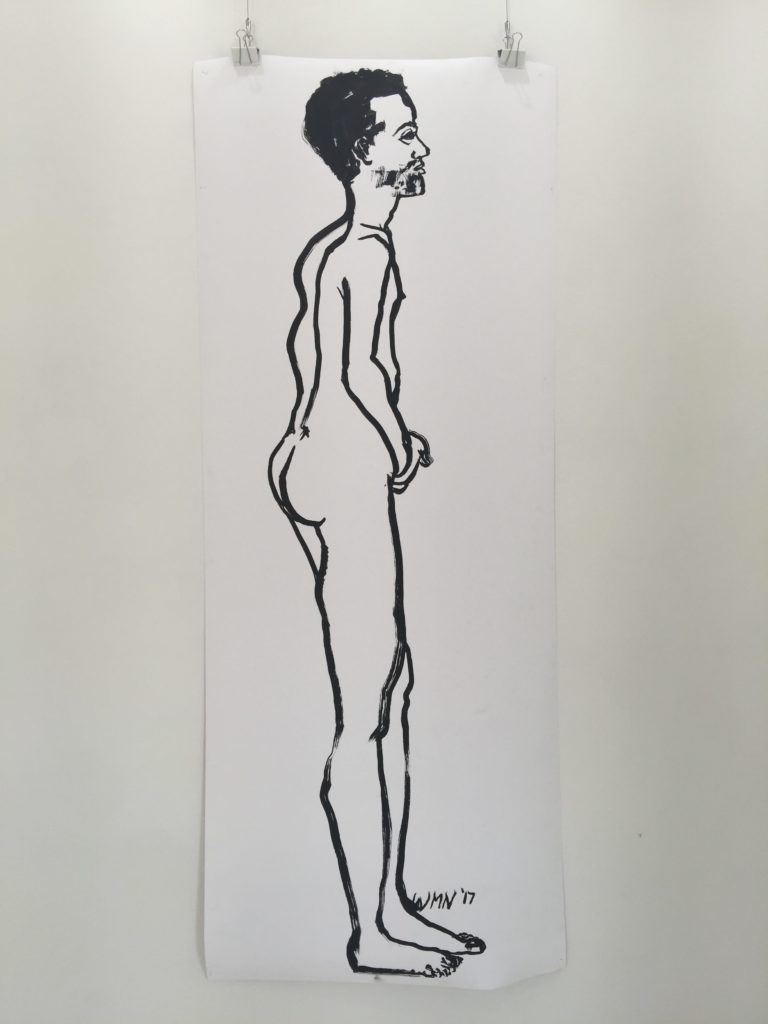
Line Drawing, 2017. Wendy Nanan.
The first work on the right wall was a male nude by Wendy Nanan. I know of Ms. Nanan as a very private person, so, this thick brush painting was one that was a treat to see. Miss Nanan was venturing out of her comfort zone to me. And I found this to be an exciting moment in her already stellar career.
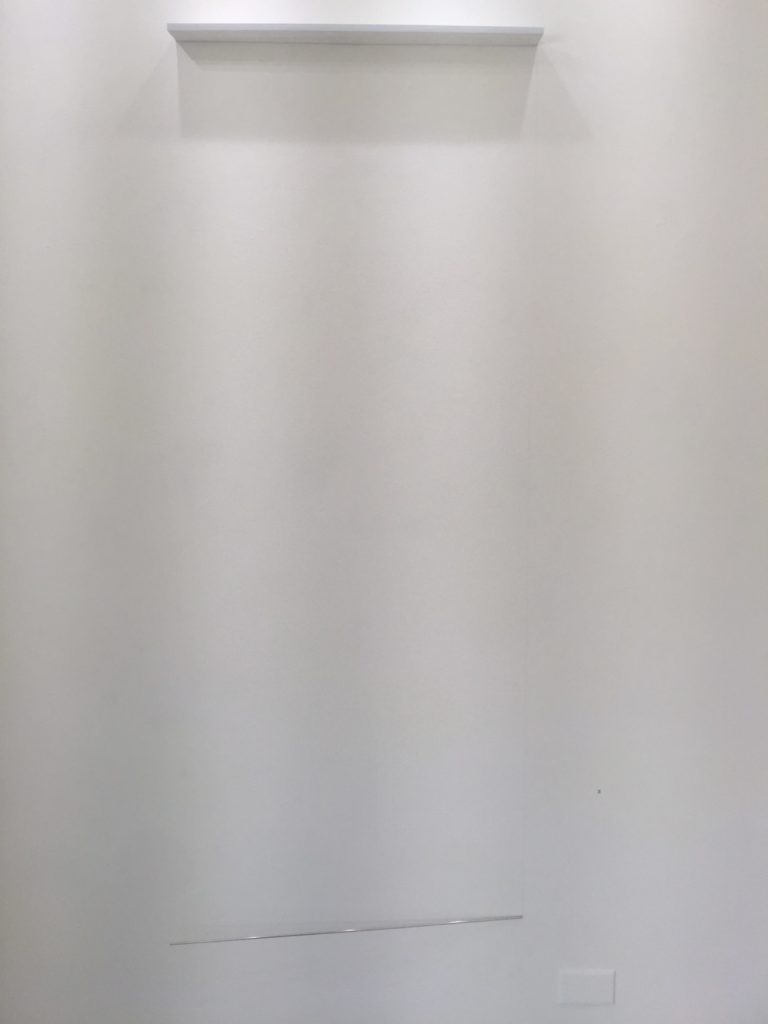
Character Flaw, 2017. Horacio Hospedales
Then, on the left wall, one could almost miss the next installation. A gently cast shadow informed a high, solid yet slight platform that was actually paper. A lone string and a slender hovering line of metal completed the awareness of the space actually ‘being.’ It was an audacious work by Horacio Hospedales titled, Character Flaw.
This concept got my adrenaline pumping, particularly because of the intellectualizing of the idea of what exactly IS ‘line?’.
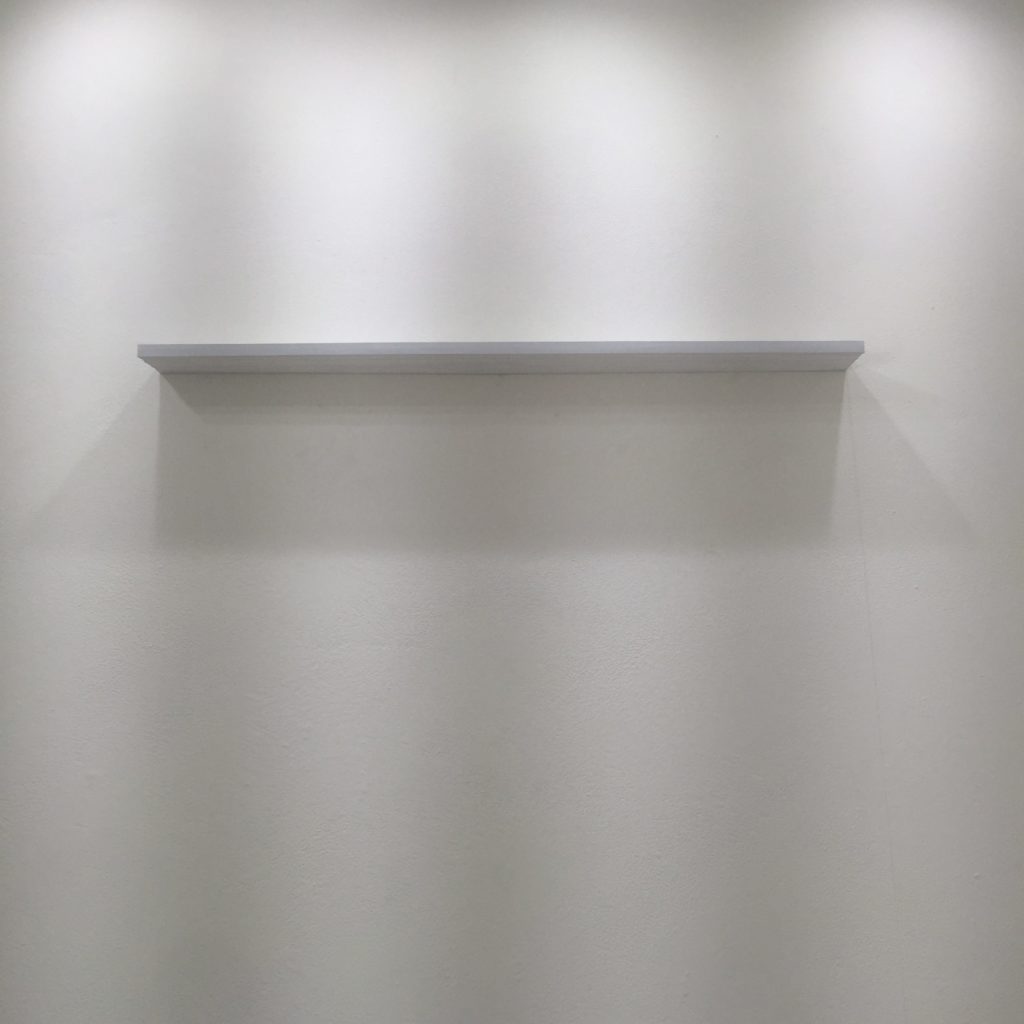
Character Flaw, 2017. (detail) Horacio Hospedales
Instantly I thought to myself, ” This is the sort of experimentation that I expect in a group show anywhere in the world, and I was glad to see it here in Trinidad and Tobago!” Risk taking in Art at its best.
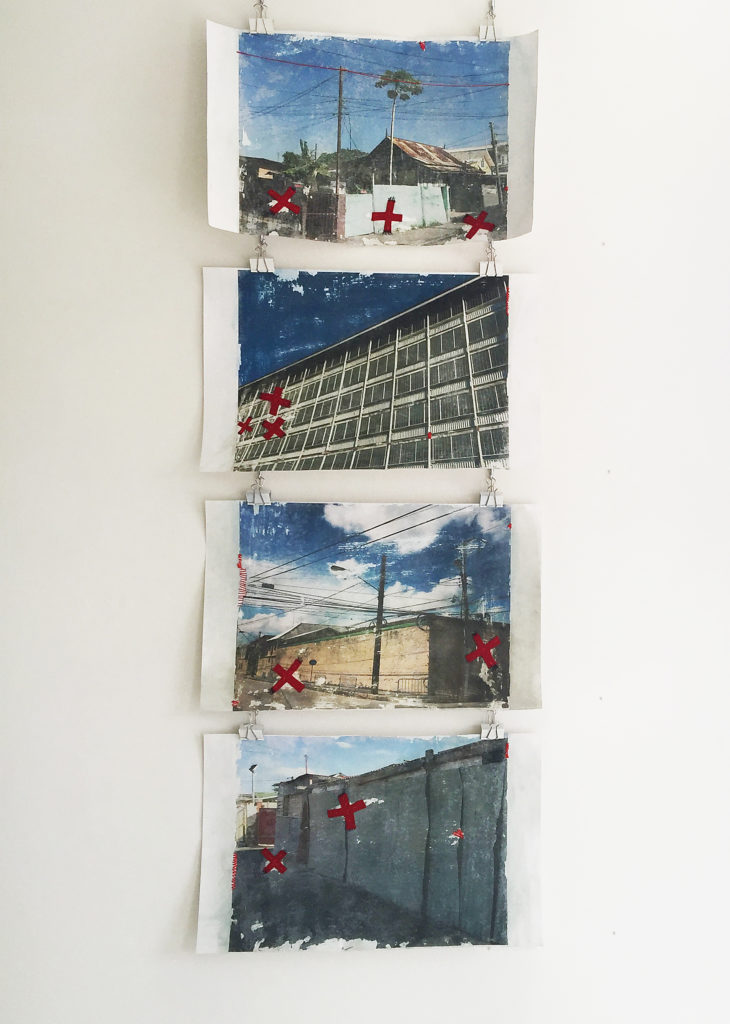
Charlotte Street, 2017. Ashraph.
As I proceeded along, four prints done in mixed media by Ashraph named, Charlotte Street, Roberts Street, Picton Street and Frederick Street and Jackie Hinkson’s use of the full sheet of paper to create a dramatic expression, called, Playing Both Sides – caught my gaze. Again, quite contrary to what one would expect of either Artist and thus, another moment of delight to me.
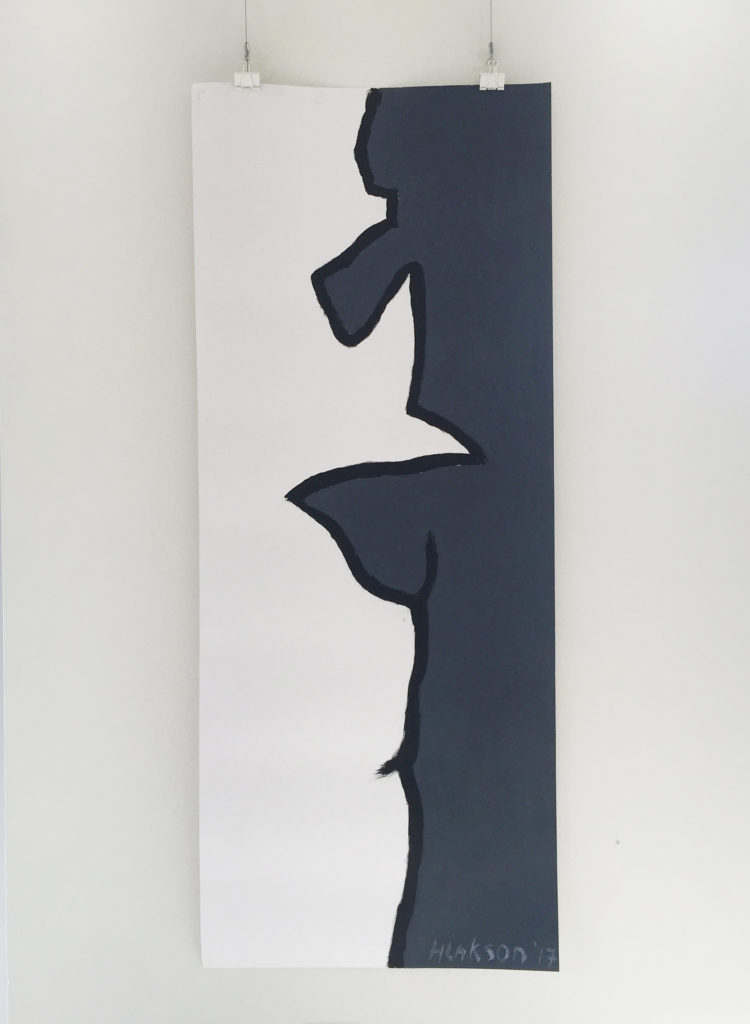
Playing Both Sides, 2017. Jackie Hinkson
By contrast, Martin Mouttet’s Out of Line as the second installation piece in the show provided the most challenge. As a dimensional work with so much storytelling, I felt that it could have been pared down considerably and been much, much more powerful.
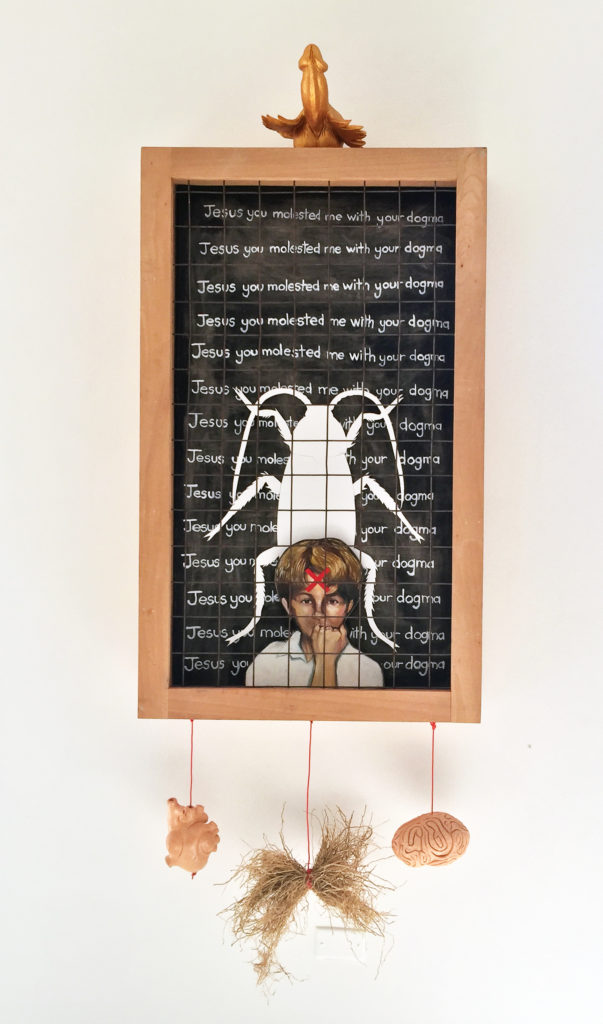
Out of Line, 1999-2017. Martin Mouttet
I felt the same as well for Josh Lue Chee Kong’s two pieces, Corbeau X and Corbeau Dreams. The poster size of both works begged the question of being more of a graphic exercise than a poised, completed work.
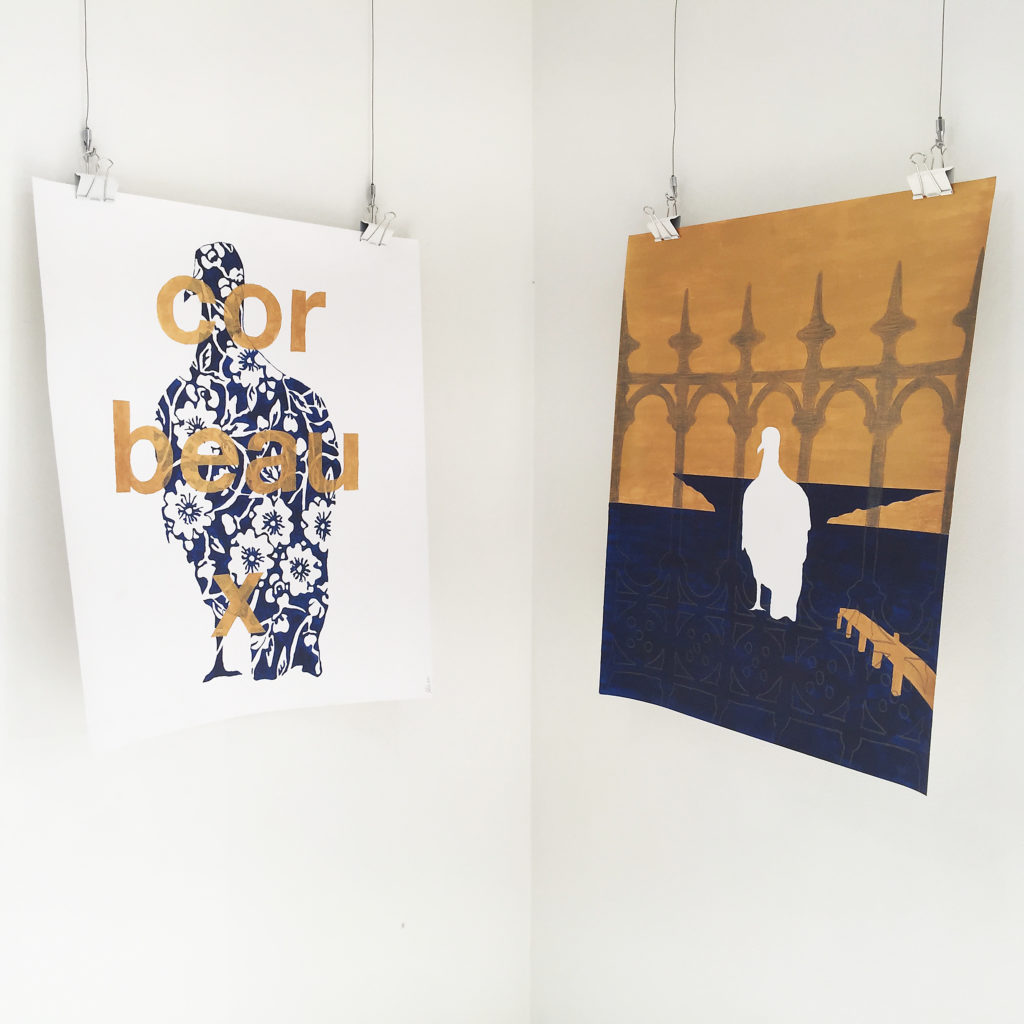
Corbeau X, 2017. Joshua Lue Chee Kong.
Susan Dayal’s Regeneration, Jade Drakes’s Nerve Map and Paul Kain’s Panty Line Series on the right side of the room did not resonate with me in any true sense of the question of line either, despite lines being clearly present in each work.
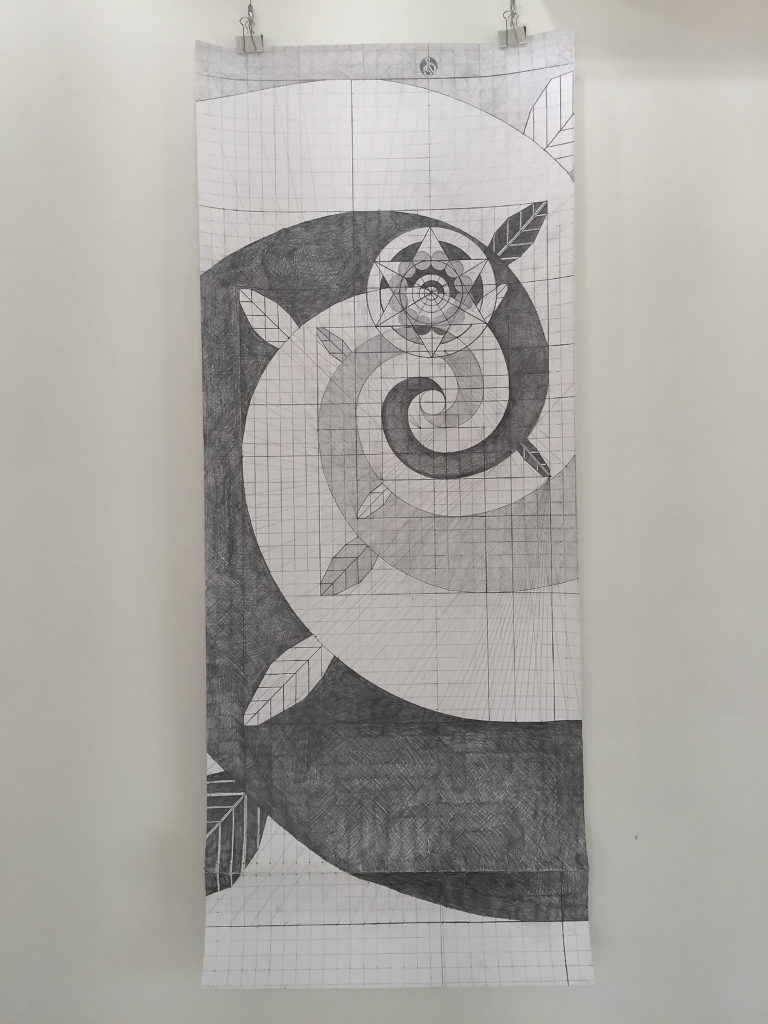
Regenration, 2017. Susan Dayal.
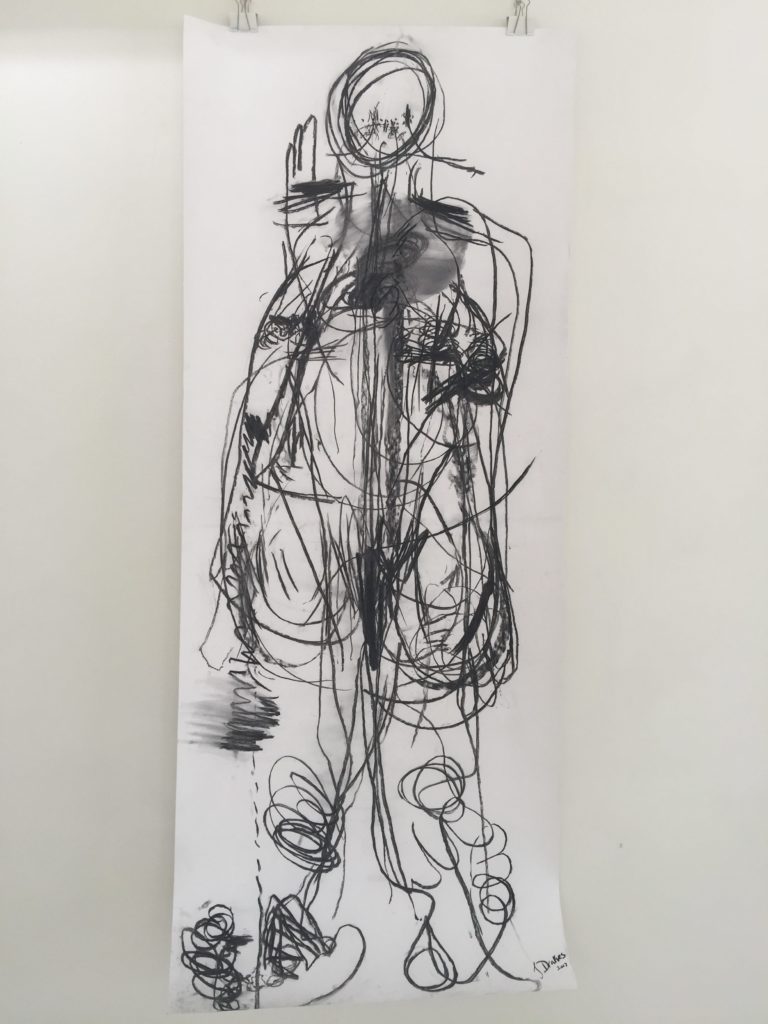
Nerve Map, 2017. Jade Drakes.
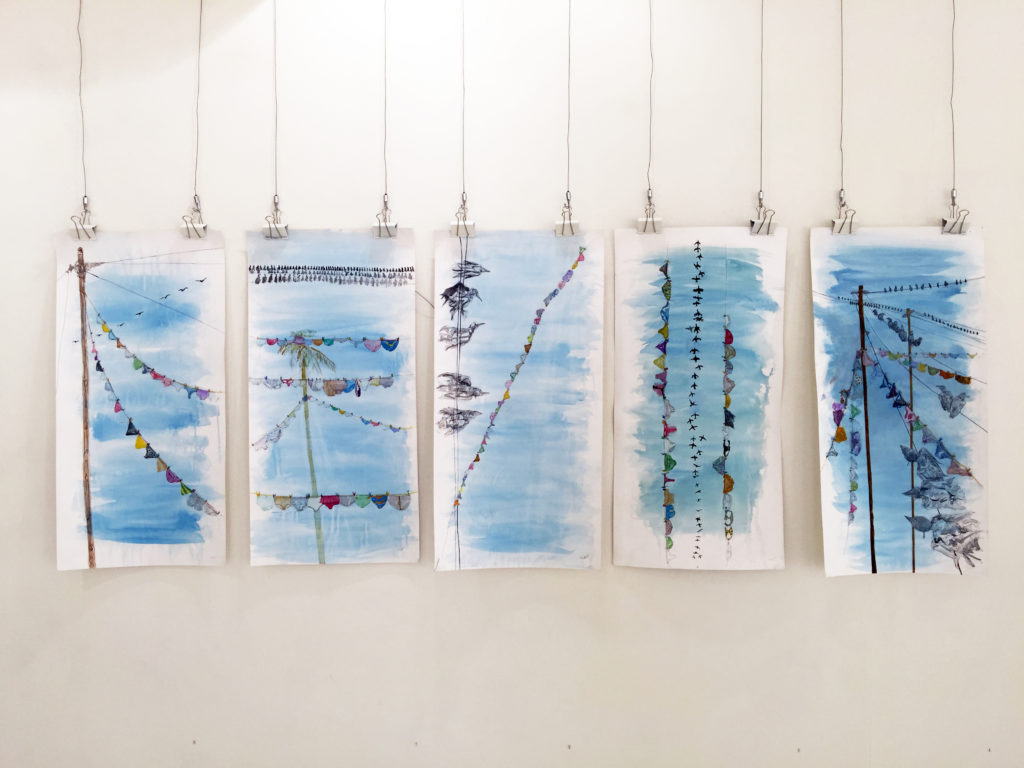
Panty Line, 2017. Paul Kain.
The challenge of themed group shows is in the interpretations and I wondered how much time was given for some of the Artists to produce the images for “LINE”? Asking Artists to prepare something specifically themed is a dodgy challenge for any gallery. As mentioned, some Artists rise to the occasion. Some find comfort and others are either left askance or take it literally, going into their stores to pull out a past piece that may or may not relate. At the end of the day, the endeavor is not always one that will show an Artist at his or her strongest.
So when I looked at Che Lovelace’s, whose body of paintings are usually filled with lush colour – I was left lukewarm by his Composition with Landscape and Jalousies. The tension between horizontal lines and the colour representing the environment beyond somehow was not, to me, held up by the scale of the paper.
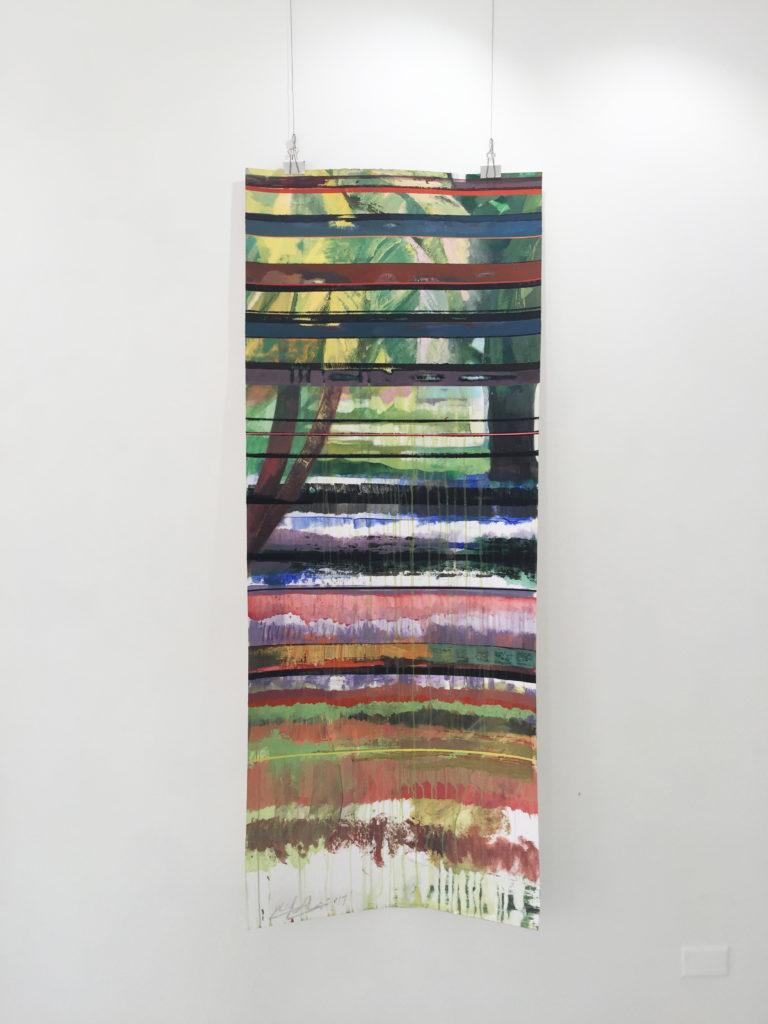
Composition with Landscape and Jalousies, 2017. Che Lovelace.
Then, titan of drawing, Eddy Bowen’s Fashion Statement made me think of the iconic ghost from the Japanese Animation, Spirited Away by Hayao Miyazaki. That aside, I was concerned with the backgound of his contribution. The work looked sprayed to prevent smudging. However, this possible “spraying” of the piece made everything that I absolutely enjoy and find stunningly beautiful about the graphite pieces of Mr.Bowen, now appeared dulled down and on the same level. So I lost the sense of rigor that his lines usually take on paper that leave the markings strong and filled with texture.
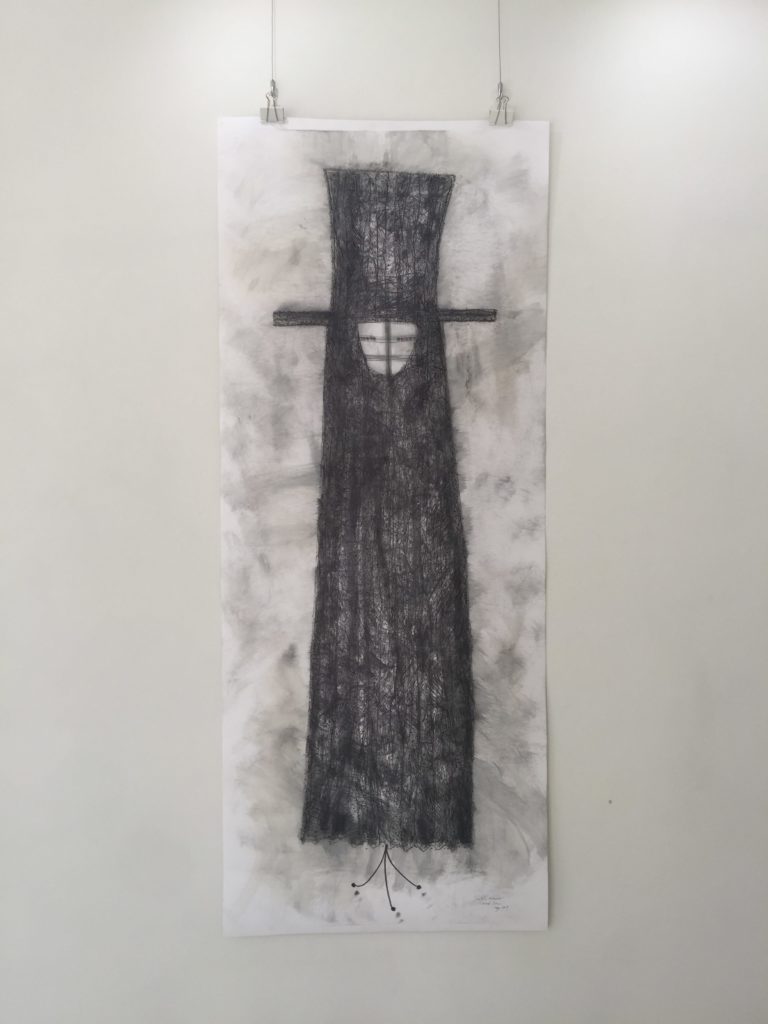
Fashion Statement, 2017. Eddie Bowen.
I felt the same challenge affecting Richard Mark Rawlin’s Polite Line, Do Not Cross. However, as there was color in his work, the dulling down of imagery being flattened out was much less pronounced. Mr.Rawlins courts controversy and his pastiche of rigorous drawing reminded me of Christopher Cozier in his heyday. The use of the clothes pin and repetitive drawing of ‘drawers’ (underwear) and ‘national dress’ worked in a ‘poster’ like format akin to American Artist, Andy Warhol, was also an image that I felt was not made better by large size, but perhaps could be better served by repetition of said paper, paired down to several sheets.
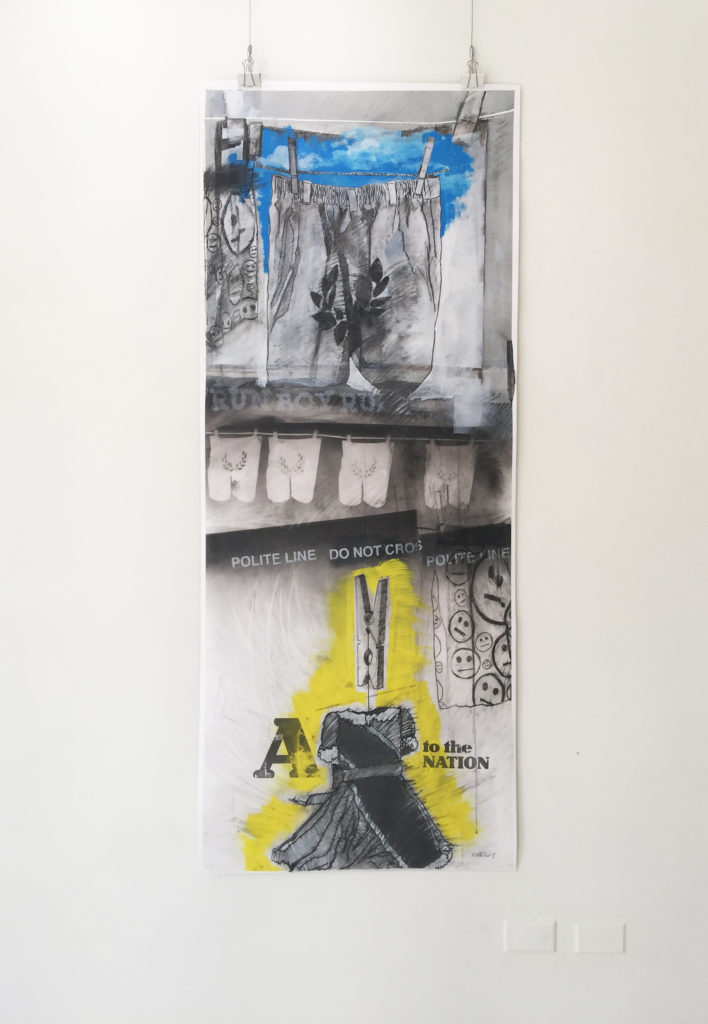
Polite Line Do Not Cross, 2017. Richard Mark Rawlins.
Of the group, experimental shows that I have seen over the years in Trinidad and Tobago, I am always aware of the need for Artists to prove themselves as working in a more international way. In fact, works such as these are less about selling and more about statement making to Curators abroad. Thus, when some pieces may look unusual or challenging in our ‘local’ space, they may be seen as humdrum in another place. It is all subjective indeed.
“LINE” is a show that I would like to see promote debate about the state of local art in Trinidad and Tobago today.
In my opinion a piece I may find weak, you may have enjoyed thoroughly, and that is perfectly fine. My pronouncements are made specifically against work on its own and against others within the framework of the gallery space. The public looking at experimental art may be left quite skeptical. For example how many people take the time to read the catalogue to gauge what they may be looking at?
Nonetheless, Yasmin Hadeed continues to make huge strides in promoting Art off the beaten path. Her risk taking with this body of work, succeeds in encouraging her clientele to experience something different from the typical figurative and idyllic things seen all the time. I highly commend her, for there is so much more for local Artists to explore in their careers in Trinidad, Tobago and beyond.
However, one takes work at face value. Whether a piece discusses domestic violence or curiosity of free form, they all are speaking beyond any attempt at intellectualizing an image.
“LINE” is meant for scrutiny. Can our public ‘get’ such work? Will they ‘buy’ it and want more of it? Is Art like this bridging a gap or creating a gap between what is Art and who it may be for? These are some things that this show made me wonder about, and when Art can cause questions to be asked, I say, that that show has done something that matters. For those who missed it, it was worth seeing. Art in Trinidad and Tobago needs a good jolt and I believe that “LINE” has started the seismic shift.
See the show’s catalogue here.
Adele Todd is an artist and educator, she lives and works in Trinidad.



